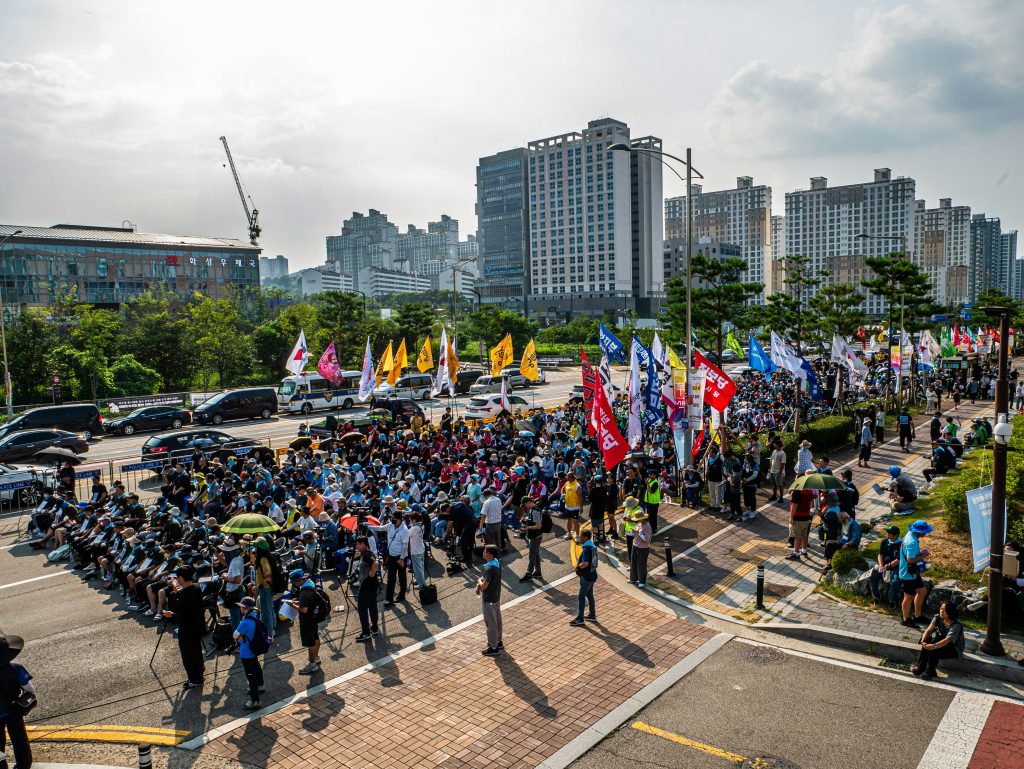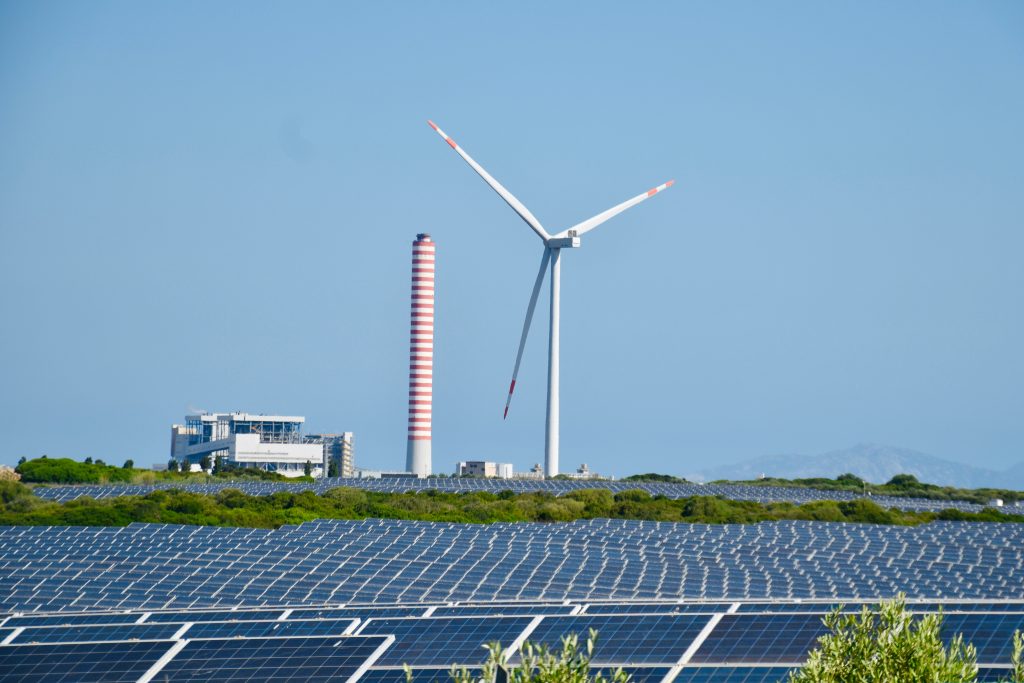UAW President Shawn Fain Addresses Democratic National Convention, Advocates for Worker Rights
In a powerful address at the Democratic National Convention held in Chicago, UAW President Shawn Fain delivered a passionate message about the importance of union support and workers’ rights. Fain emphasized the critical role that unions play in empowering the working class, asserting that Vice President Kamala Harris has shown unwavering support for labor unions and the needs of everyday workers.
Fain’s speech came as the United Auto Workers union continues to navigate a complex political landscape, particularly in the lead-up to the 2024 elections. He drew attention to the connection between political leaders and the labor movement, highlighting how essential it is for politicians to stand firmly with the working class. “We need leaders who will stand shoulder to shoulder with us, not just during election season but every day of the year,” Fain declared, rallying the audience’s enthusiasm for a stronger labor movement.
Using stark language, Fain did not shy away from criticizing former President Donald Trump, referring to him as a ‘scab’—a term used to describe workers who break picket lines during strikes. This metaphor reflected Fain’s view that Trump and others like him serve the interests of the wealthy elite rather than the working class. He also condemned Republican Senator JD Vance, labeling him as a ‘lap dog for the billionaire class.’ Such remarks underscore Fain’s commitment to advocating for the rights and dignity of all workers, as he urged those in attendance to support candidates who genuinely prioritize labor rights.
Fain’s participation in this high-profile event marks a significant moment for the labor movement, as he represents a growing tide of union activism across the United States. The UAW has been at the forefront of labor negotiations, and Fain’s leadership has been pivotal in mobilizing union members and their allies to advocate for better wages and working conditions.
The atmosphere at the convention was charged with energy, as Fain inspired unity among attendees, calling for collective action to ensure that working-class voices are heard in the political arena. He encouraged Democrats to recognize the importance of labor support in winning elections and to commit to policies that benefit all workers, not just a select few.
As the Democratic Party gears up for the upcoming elections, Fain’s message resonates deeply with the electorate, particularly among union members and working-class voters. His call to action serves as a reminder of the critical intersection between labor rights and political power, and the necessity for continuous advocacy for the rights of workers.
In conclusion, Shawn Fain’s address at the Democratic National Convention not only highlighted the urgent need for labor support in politics but also set the stage for a renewed commitment to the fight for workers’ rights. As the political landscape evolves, Fain’s leadership within the UAW will undoubtedly play a crucial role in shaping the future of labor advocacy in America. The labor movement is more than just a response to economic challenges; it is a vital force for social change, and with leaders like Fain at the helm, it is poised to make significant strides in the coming years.
Tags: Democratic National Convention, Labor Rights, Shawn Fain, UAW
UAW President Shawn Fain Takes Center Stage at DNC, Criticizes Trump and Champions Union Support
In a powerful display of solidarity and political fervor, United Auto Workers (UAW) President Shawn Fain made headlines at the Democratic National Convention, held in Chicago. Fain’s presence was not merely ceremonial; it was a clarion call for union support and a fierce denunciation of former President Donald Trump. Addressing an audience of Democrats and labor supporters, Fain emphasized the importance of unions in elevating the voices of working-class individuals, asserting that Vice President Kamala Harris would be a staunch ally for labor rights.
Fain’s rhetoric was sharp and unyielding, as he labeled Trump a ‘scab’—a term traditionally used to describe workers who cross picket lines during strikes. This provocative language underscored Fain’s commitment to holding political figures accountable for their actions in relation to labor rights. Throughout the 2024 election cycle, Fain has consistently used this terminology to draw stark contrasts between the interests of labor and the agendas of what he describes as the ‘billionaire class.’
The UAW leader’s address resonated with many in attendance, as he connected the dots between union strength and the broader political landscape. He articulated how the rights of workers are intrinsically linked to the health of democracy, urging attendees to consider their votes carefully in the upcoming elections.
Fain’s speech was not just a diatribe against Trump; it was a rallying cry for workers everywhere. He positioned the UAW not only as a labor organization but as a powerful political force that can influence the direction of policy and governance. The call to action was clear: the labor movement must unite to ensure that the voices of workers are heard and prioritized in the political arena.
As the Democratic National Convention progresses, Fain’s remarks will likely serve as a touchstone for discussions around labor rights, economic justice, and the role of unions in contemporary politics. His ability to galvanize support among Democrats and labor advocates alike highlights the growing intersection of labor issues within the broader political narrative leading into the election year.
With the stakes higher than ever, Fain’s leadership and the UAW’s active engagement in the political process signal a renewed commitment to fighting for the rights of workers and ensuring that their interests are front and center in the national conversation. The UAW’s stance against Trump and his associates, whom Fain referred to as ‘lap dogs for the billionaire class,’ reflects a growing discontent with the status quo and a demand for a more equitable economic system.
As the convention unfolds, Fain’s words will undoubtedly resonate with many voters who are seeking change and a reaffirmation of their rights as workers. The UAW’s mobilization efforts, combined with Fain’s fiery rhetoric, suggest that labor will play a crucial role in shaping the outcome of the 2024 elections. The question now remains: will the Democratic Party rise to the occasion and embrace the labor movement in a way that honors the struggles of working-class individuals across the nation?
Tags: Democratic National Convention, Donald Trump, Kamala Harris, Labor Rights, Shawn Fain, UAW
UAW President Calls Out Trump as a ‘Scab’ at DNC, Igniting Social Media Debate
In a significant moment during his address at the Democratic National Convention, United Auto Workers (UAW) President Shawn Fain made headlines by labeling former President Donald Trump a ‘scab.’ This term, typically used to describe workers who cross picket lines during strikes, has sparked a heated discussion across social media platforms. Fain’s remarks resonated particularly within the labor community, reflecting the ongoing tensions between union members and those perceived as undermining their efforts.
Wearing a shirt emblazoned with the term, Fain emphasized the importance of solidarity among workers, particularly in states that have historically supported the Democratic Party, often referred to as the ‘blue wall’ states, including Michigan and Pennsylvania. His strong words about Trump being a ‘scab’ were not just a personal attack but a broader commentary on the former president’s policies and actions that many union members believe have harmed their interests.
Fain also praised current Vice President Kamala Harris as a ‘fighter’ for the working class, contrasting her dedication to labor rights with Trump’s record. The UAW, which boasts over a million active and retired members, is at the forefront of labor rights discussions, especially as the automotive industry faces critical changes and challenges, including the push towards electric vehicles and the implications for jobs.
The debate around the term ‘scab’ has historical roots in labor movements, where crossing picket lines is viewed as betrayal to fellow workers. Fain’s usage of this term highlights the deep-seated frustrations that many union workers feel towards those they believe do not support their rights and livelihoods. As the conversation continues to unfold online, it has opened a dialogue about the role of unions in the modern workforce and the ongoing struggle for worker rights in the face of political opposition.
As the DNC progresses and the 2024 elections loom, the intersection of labor issues and political rhetoric will undoubtedly remain a focal point for both parties. Fain’s remarks have not only invigorated supporters but also reignited discussions about the labor movement’s future and its impact on American politics.
In summary, Shawn Fain’s bold statement at the DNC has reverberated through social media and labor communities, serving as a reminder of the critical role unions play in advocating for workers’ rights and the challenges they face from political figures who may undermine those efforts. As the UAW continues to navigate this complex landscape, the implications of these discussions will likely shape the narrative leading up to the next presidential election and beyond.
Tags: DNC, Donald Trump, Labor Rights, Scab, UAW
UAW Files Labor Charges Against Trump and Musk for Intimidation
In a significant move reflecting ongoing tensions between labor unions and high-profile business leaders, the United Automobile Workers (UAW) union has filed federal labor charges against former President Donald Trump and Tesla CEO Elon Musk. This action comes in response to a livestreamed conversation where both figures allegedly made comments that were interpreted as threats towards UAW members. The union argues that the remarks made by Trump and Musk during their discussion could be seen as intimidating, undermining the rights of workers to organize and engage in collective bargaining.
UAW President Shawn Fain expressed strong condemnation of the comments, stating, “When we say Trump stands against everything our union stands for, this is what we mean. Donald Trump will always side against the working class.” This statement underscores the union’s belief that Trump’s past and present actions are detrimental to labor rights and protections.
The union’s legal complaints have been directed to the National Labor Relations Board, echoing concerns over the influence that powerful figures like Trump and Musk may have on labor dynamics within the automotive industry. The UAW emphasizes that such intimidation tactics are not just harmful to individual workers but also threaten the integrity of union representation as a whole.
The livestream, which touched on various topics, saw Trump praise Musk for firing employees involved in strikes. This endorsement of aggressive management tactics has raised alarms among labor advocates, who view it as an attack on the fundamental rights of workers to protest and demand better working conditions.
This situation highlights a broader conflict between labor unions and corporate leaders, particularly in industries undergoing significant transformations, such as the automotive sector amidst the rise of electric vehicles. As the UAW takes a stand against what it perceives as bullying from influential figures, it reiterates its commitment to protecting workers’ rights against any form of intimidation.
In a climate where labor relations are becoming increasingly contentious, the UAW’s actions serve as a reminder of the ongoing struggle for workers’ rights and the need for solidarity among union members. As the automotive industry evolves, the implications of this conflict may resonate far beyond the immediate parties involved, potentially influencing labor relations across various sectors. The UAW’s filing could also spark further discussions about the role of leadership in shaping labor policies and the responsibilities that come with such influence.
As this story develops, it will be crucial to monitor the responses from the National Labor Relations Board and the broader implications for labor relations in the United States. With the growing visibility of labor issues and the increasing assertiveness of unions, the dynamics between corporate power and worker rights are likely to remain at the forefront of public discourse.
Tags: Intimidation, Labor Rights, Musk, Trump, Trump Musk, UAW



